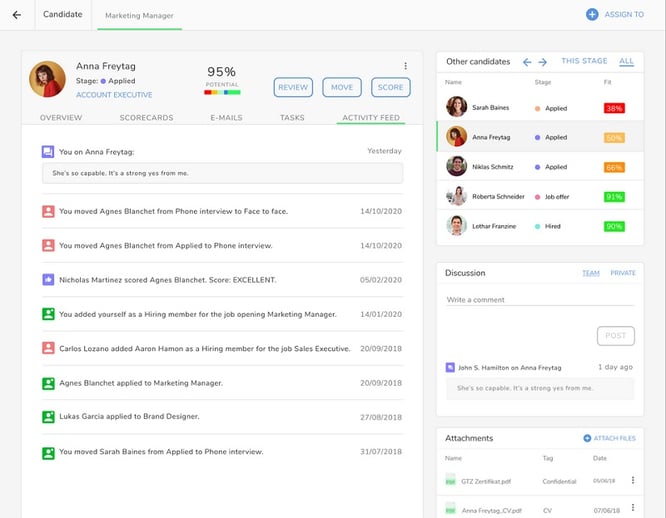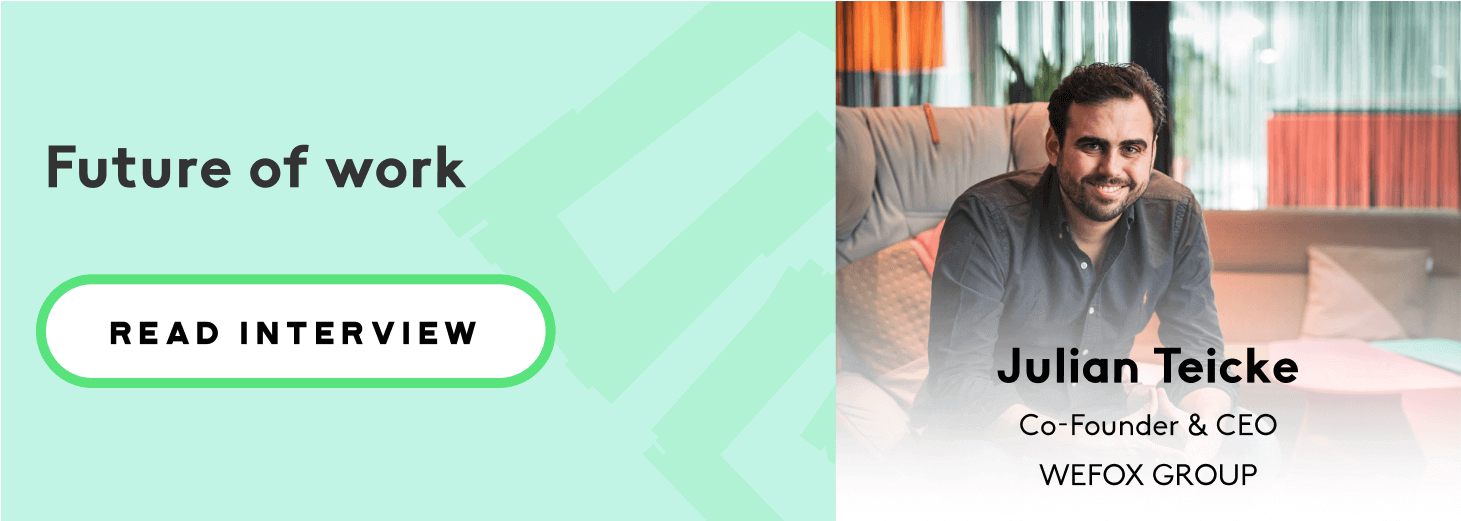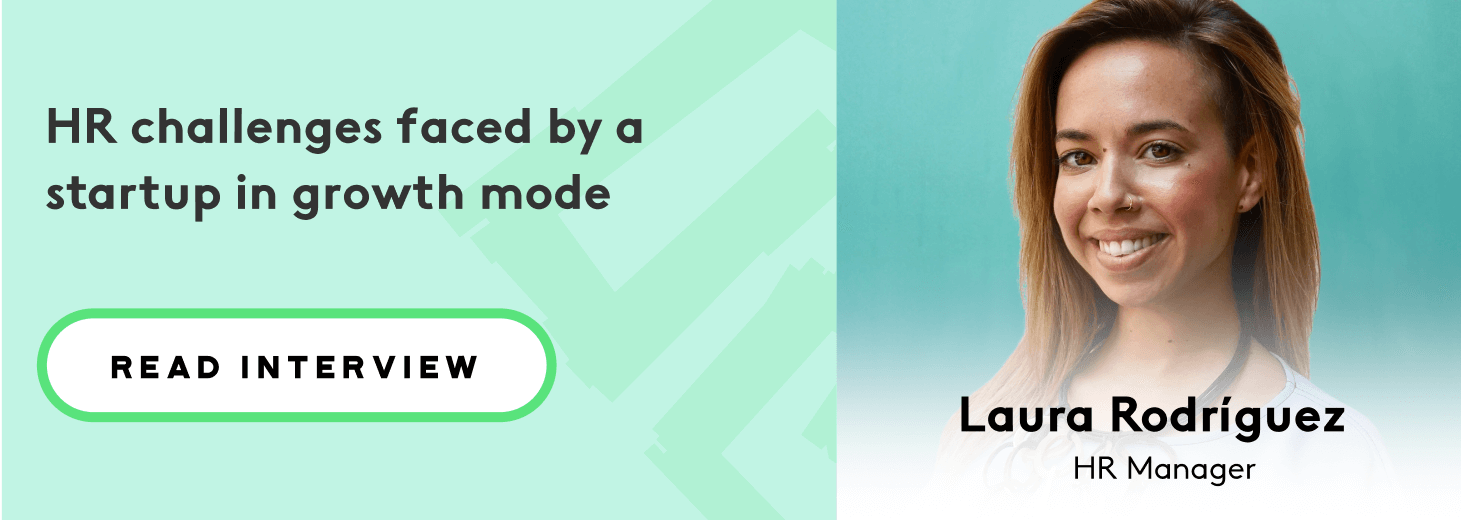The art of Recruiting Millennials - Interview
.jpg)
Without a shadow of a doubt, opening an Kenjo office in Berlin has not only given us access to an international field of qualified talent, or the chance to experience one of Europe’s most bohemian and energetic cities, but we are now surrounded by some of the tech industry’s most innovative and inspiring companies such as Truffls - the Tinder of German job search market.
As Kenjo is a software that helps all areas of a human resources department (from recruitment to people management), we are always closely following companies that offer recruitment solutions, job portals, CRMs for human resources, HR consultants and other businesses that work with HR professionals. We’ve been big fans of Truffls for some years because, like us, they support the idea that the workforce has changed drastically, and that HR departments - as well as the tools they use - have to adapt accordingly. Truffls is a clear example of how we need to adopt a “millennial mindset” in recruiting, talent management and in the support and evaluation this new workforce.
.jpg?width=150&name=Lisa%20Maria%20-%20Interview%20(2).jpg) In today’s interview, we talk to Lisa Maria, Head of Marketing at Truffls. A professional that knows only to well how the recruitment world operates, as well as the pains and needs of both job seekers and recruiters.
In today’s interview, we talk to Lisa Maria, Head of Marketing at Truffls. A professional that knows only to well how the recruitment world operates, as well as the pains and needs of both job seekers and recruiters.
How was Truffls born?
Two of Truffls’ founders, Matthes and Clemens, originally met at an Entrepreneur in Residence program in Hamburg, 2011. They were both already conceiving new recruitment concepts like Facebook recruiting or recruiting via soft skills instead of CVs. With the arrival of Tobias, the third founding member, the idea of developing their own platform using the swiping concept was born. In 2014, Tinder was extremely popular in Germany and also helped us to expand. From that point onwards, we began to revolutionise the recruiting industry.
Several German media outlets have called Truffls the "Tinder for jobs". Why is that?
That’s right, and it’s actually the easiest way to describe the Truffls app. It works like this: as a candidate you download the app, fill out a profile, upload a CV from a social network (e.g. Xing or Indeed) or your phone/laptop. Once you’ve done this, you’re shown matching jobs that you either swipe left (not interested) or right (interested) – just like Tinder. If you’re interested in a job, the recruiter gets a notification with your profile. Next, the recruiter (who works with a browser-based dashboard) can match and directly start the application process with you (chatting, sharing documents, etc).
What is the main USP of your product, what problem do you solve?
Our purpose is clear and easy to understand. To make job search and recruiting a more enjoyable experience, Truffls simplifies and accelerates the recruiting process significantly.
Our solution works best for people who are time-poor. Highly talented people are often looking for new opportunities passively, rather than actively. Ninety percent of the applicants registered in the app currently have a job and 85% have an academic background, meaning they’re highly qualified. They are not willing to spend a great deal of time searching for new opportunities, but they’re generally open to new challenges. We give them the opportunity to keep an eye on new positions and makes it very easy to get in touch with organizations on an equal footing.
Great candidates are very hard to find these days, due to demographics and the constant struggle for new, qualified talent. With Truffls, recruiters can easily and effortlessly identify high quality talent. At the end of the day, it’s about building connections between interested candidates and recruiters. It can often take only a week from the “match” stage to a signing the contract.

Image of Kenjo's recruitment tool software
How difficult is it to hire in 2020 in Germany?
According to studies, 2020 marks a turning point in the German job market. Until now, the number of potential candidates has risen consistently on a yearly basis. In 2020, this number will start to stagnate and in the future it will even begin to shrink. You can imagine what that means for organisations that already have difficulties finding skilled employees. The reasons for this? A positive economic situation, demographics, and strong competition for talent.
HR managers, what areas do they struggle in when hiring?
During my experience in marketing I’ve noticed that trends and developments in online marketing also show up in HR, albeit within a delayed time frame. For example, data-driven decisions, channel testing or user (or candidate in this case) journeys. In marketing, if we don’t keep up with fast-paced trends and don’t make data-driven decisions, we will not be successful.
And that’s exactly what HR are doing: for a very long time, organisations held the power and didn’t see the need to offer candidates a good candidate journey or to optimise the funnel. They are now struggling in nearly every area of recruitment and talent retention. This is their last chance to shift their mindset and become candidate-focussed, in the same way that it’s a no-brainer that marketing or sales need to be customer-focussed.
Truffls helps with this challenge. Once an organisation has made the decision to go mobile, our solution will not only help improve their candidate journey and help them to recruit faster, but just having visibility in a revolutionary tool like ours will also boost their employer branding.
Are HR managers ready to recruit this new generation of employees?
When Matthes, Tobias and Clemens started Truffls, nobody believed that one day the whole recruiting process would switch to mobile. Five years later, we have a great customer base, nearly 500.000 downloads of the app and the recruiting process works via mobile devices. Even so, digitisation has only just begun and there’s still a long way to go. HR managers have to prepare themselves with new skills and tools, otherwise they will no longer be able to find great talent.
What trends have you spotted in the new millennial workforce?
It depends which generation you want to describe with “new millennial workforce”. The Generation Y workforce (born between 1980 - 1994) is different to the Generation Z workforce (born between 1995 - 2010). Generation Y is are often described as globalists, self-oriented and searching for economic stability. Alternatively, Generation Z is the first “true” generation of digital natives who require two-way dialogue, they are communaholics and are “searching for truth”. They are for more demanding and are constantly challenging their employers in terms of work-life-balance or purpose-driven habits.
Millennials want things to happen fast, that’s why your "swipe left/right" mobile app is performing so well for recruitment. Do you think this attitude will change other areas of Human Resources?
As I mentioned before, when the app was launched, no one believed that this could work in the target group. Last year, we celebrated the fifth anniversary of a colleague at Truffls and to everyone it felt like celebrating a dinosaur (obviously a very, very cool dinosaur 😜. Being in a job for more than two years is a rarity these days. People want a lot and they want it now, and if they don’t get it they know they will somewhere else. This affects all other fields as well. Keeping up a company culture in an organization that looks totally different every year is a very tough job.
What advice would you give recruiters when hiring millennials for "old school" roles?
The question is, what is an “old school” role and is there a place for it in my organisation? Which area has not been digitised yet and if it’s not, why not? And shouldn’t I rather capitalize on the millennials’ talent, as they are digital natives, and transform those “old school” roles into ones that survive in the economy of the future?
What does the future of recruiting looks like?
Different – and it all depends on what we make of it! I think it’ll look very bright if recruiters accept that we’re in a market where the employee holds the power. I can confidently say that from a marketing perspective, where the customer has always had the power, and we’re still enjoying our jobs. ;-) It’s a challenge, that’s for sure. And only those that are clever enough to adapt to the changing environment, by improving their candidate journeys, going mobile and making data-based decisions, for example, will survive. However, we all have the same opportunities to do so.


